Please Please Just Fuck Off With This Bullshit: Lamacq & Whiley & The Lie Of 'Britpop'
Why is it always the reactionary who get to do revisionism? A few thoughts.

Nothing more enraging than a badly rewrit history.
Actually before we even get to that - there IS something more enraging and that’s because it’s more enraging than any other sound on earth. It’s the sound of Jo Whiley’s voice. Every time I hear it I can picture her insufferably smug expression, I can picture her grinning and nodding in agreement with another legendary bit of Noel Gallagher bants, I can her utterly revolting dismissal of Lily Allen as just a daft girl who doesn't deserve an opinion on music, I can picture her struggling with Mark E.Smith's refusal to join her in speaking the corpse-breathed corporate-spiel she thinks passes for communication - I can hear ultimately the sound of someone who perhaps kindalikes music, but who blatantly loves money and business and marketing more, someone whose indiscriminate endless sycophancy around musicians (and consequent snotty snobbery around anything that wouldn’t coincide with her grisly ‘real music played by real people’ conservatism) percolates into everything she does, everything she plays, everything she’s ever said and done in nearly three decades of co-opting the independent and ‘alternative’ into the corporate deathspiral of her soul. Who knows what Whiley thinks or feels about music? Who can recall a single thing she’s ever said about music? For Whiley, if you’re an indie band/bloke, and you’re signed/successful/willing to join her live from Maida Vale that’s all that matters, and it deserves cheerleading and applauding for the sheer effort and success in and of itself and nothing else. Her voice is the living embodiment of the word ‘iconic’, the word ‘legendary’, and the words ‘coming up, Snow Patrol live from the Livelounge’ and I will die happy knowing I will never ever have to endure hearing it emit a single simpering syllable again.
Tbh I feel nearly as enraged when I hear Lamacq’s whiney drawl n’all (. . yes yes I know Lamacq is by official consent a ‘nice bloke’ and a ‘music fan’ and so immune to critique. We’ve got enough fucking ‘nice blokes’ running the show if you ask me . . .) The vague line in that Guardian piece is that Whiley was some kind of honourable descendent of Annie Nightingale, and Lamacq/Whiley’s Evening Sessions were like a Janice Long for the 90s, a more-easily-digestible preliminary to the Peel show that followed them every night. This is patently, for listeners who weren’t middle-class & spoonfed-lazy, a nonsense. Many of us STOPPED listening to the evening show PRECISELY when Lamacq/Whiley took over because where with Janice (and on a Sunday night, with Annie) we felt we were in the company of someone properly funny, properly loveable, and properly a pop fan, friends and compadres in our lonely rooms , with Lamacq & Whiley we felt we were being condescended to less like a family or a community and firmly like a demarcated demographic who shared the hosts’ snotty indie-superiority about pop, happy to surrender the notional idea of an independent musical culture to big business, laddishness, commercial consensus, to firmly buy into Morrissey-esque ideas of blackpop’s artifice and whiterock’s realness. Whiley & Lamacq, contrary to Peel’s genuine openness and range, presented a horribly withered be-denimmed endless 90s version of Disco Demolition Night; appalled by what was actually thrillingly going on in music in the 90s they presented a deoderised three hours of jingly jangly Kings Reach Tower-sanctioned dullness as if it was a head-wrecking face-fucking sonic revolution and set in stone the decades of empty blustery hype around suffocating mediocrity that has long-since passed for music ‘coverage’. I think we can hold them both accountable for the career of Zane Lowe and if for nothing else, they should be shackled in the Tower for that alone.
Difficult to avoid Whiley’s ICONIC smarm, because whenever the BBC want to trail its committment to live music her grotesque ‘its just so cool to be with the legendary [insert blokey cunt]’ tones will pop up on a snippet or a trailer, reminding of you of festivals in all their ICONIC portabog-straddling gruesomeness. I’ve grinned, borne it, like we all have since Whiley and Lamacq’s overwhelming ICONIC smuggery first inveigled into our awareness 30 odd years ago but a Guardian article that shat itself into my feed last week chafed on my ICONIC tit-ends something so chronic I started to feel compelled to offer at least some kind of perspective/rejoinder. The pull-out quote should’ve tipped me the wink.
Let’s get this straight before it gets forgot - Lamacq/Whiley, contrary to their own self-mythologising, were actually emblematic of everything most craven, servile, and plain fucking BORING about the 90s but of course it’s them, like it’s always them and Maconie/Harris/NME/assortedmates who get the final word about ‘independent’/alternative cultural history, who get to crayon-stroke out the nuances and shades of a period in pop, because it best serves their own sepia-tint of retrospect, best smears and evades precisely the incestuous insularity of the scene they celebrated, and neatly sidesteps the grotesquely withered (& emphatically patriarchally/racially-tinged) parochialism that was their animus. I’m less irked by the Guardian running that piece than I am by the fact it showed up in my social media feeds; what truly vexes me is that this pair of smirking smarmy bullshitters have been given a whole series on BBC Sounds to expound on ‘the legacy of Britpop’ and its alleged renegade snook-cocking at the industry.
I love the BBC and I pay my license fee and I do that with the knowledge that the BBC make programmes for everyone, and that there’ll be shows I don’t like. This is the price of a public service remit, and I’ll willingly fund a network that brings us the Moral Maze and All Radio 4 comedy if it also brings us the World Service and Radio 3. But when that price entails outright lies and hoaxery like this, it aggravates, and so, of course, like someone touching a wound to see exactly what execrescence seeps out, I had to listen. And fuck me I wish I hadn’t. It seems so strange to have a six part documentary on a a phenomenon that outside of Stuart Maconie’s notepad, REALLY DID NOT EXIST. A quick precis will suffice, I went there, so you don’t have to.
Episode 1 - Cliche/Lie #1 - We needed Britpop as a necessary corrective to the music scene in 1992/1993, as a rebuttal of Grunge, and as a celebratory counteractive to the 92 election result.
Did we fuck. That utter bullshit line that in some way we needed some return of British ‘wit’ and ‘camp’ as a rejoinder to Grunge’s overwhelming gruffness and authenticity is an absolute crock - Grunge was at its best, an absolutely inauthentic yet thrilling confection of 70s excess, 80s post-hardcore and pop nous. It weren’t all fucking Pearl Jam, and if you couldn’t enjoy Alice In Chains/ Tad/ Soundgarden/ Mudhoney as pop, I’d suggest you weren’t really listening and that’s even IF you’re dimwitted enough to buy that reductive headline-lazy bullshit about Grunge being the only US rock we were immersed in. It’s still NEVER been satisfactorily explained to me why every NME vision of ‘Britpop’ (ugh, that name, coined one suspects by the same kind of people who’d proudly call themselves a ‘Brit’) seemed to only include white blokes in guitar bands and not ALL the british pop music being made, from ALL sides of the racial/class tracks, that was utterly thrilling in 93. If I wanted to hear something resistant to the UK regime at the time I had deepest darkest techno and jungle and Asian rap music and Riot Grrrl and a whole lot of music whose answer to the horrific present was to confront and call it out, rather than click its heels together and pasquinade itself back to some mythical 60s idyll when all was well and 'guitar music’ was king. If I was listening to Origin Unknown, Insides, Orbital, Hyper On Experience, Rufige Kru, Stereolab, Pulp, Pram, DJ Crystl in 93 was I not listening to British pop? And if I listened to Flaming Lips, Grant Lee Buffalo, Liz Phair, Madder Rose, Monster Magnet, Labradford, Tool, Girls Against Boys, Mazzy Star, Afghan Whigs in 93 was I listening to ‘grunge’? Reductive histories can always answer back - well we’re just covering THIS scene, we’re just talking about THESE bands who happen to be the most ‘popular’. But why is always the same scenes, and always the same people who get to decide what was ‘happening’? Why aren’t those other stories being told? I say if a cultural history has to be so reductive to even be coherent, has to deliberately obscure and eliminate so much just to tell its narrative, that’s a cultural history not worth telling, and perhaps a cultural history only useful to those DJs, writers and self-appointed cultural curators who were too lazy and narrow minded to really apprehend what was going on. Fuck Britpop (and by extension fuck the idea of ‘grunge’) as some kind of musical Brexit/MAGA from 93’s more diverse realities on BOTH sides of the pond. They are myths and stories told by the reactionary, for the reactionary.
Episode 2 - Cliche/Lie #2 The success of Parklife meant some kind of massive change in pop music.
Did it fuck. The single that no-less an authority than cultural vandal Mark Sutherland called ‘the barmiest pop single ever’ peaked at number 10 in the UK charts. A record approximately two billion times better - Baby D’s ‘Let Me Be Your Fantasy’ got to number one for two weeks and deserves roughly two billion times the column inches that ‘Parklife’ got and gets. Difference being, the people who write about pop were being jazz-hands-cunts at indie bops to Parklife in 94 and were doubtless hugely snotty about the likes of Baby D and Whigfield as ‘not proper music’, smarmily superior to fans of those songs as being townies & chavs. The charts were dominated that year, like they were through all the years supposedly ‘claimed’ by Britpop’s anschluss by the usual mix of boy-bands, dance tracks, reggae and hip hop and unshiftable commercial juggernauts by Celine Dion & Wet Wet Wet. What did ‘Parklife’ actually change? It merely proved that novelty records will always sell. All it’s ever been. Don’t be fooled - it was a novelty minor-hit in a lineage that includes the far superior ‘A Little Bit Of Toast’ and ‘What Are We Going To Get for Er Indoors’. As with the similarly execrable ‘Boys & Girls’ and ‘Country House’, Blur are at their absolute worst when sneering.
"Who wants to be an Indie Noise-Freak, alienating everybody?" - Damon Albarn
Episode 3 - Cliche/Lie#3 - How the ‘youthquake’ of Britpop infected the entirety of UK culture.
Get to fuck. Britpop’s tiresome yet undeniable ‘prominence’ in the cultural landscape was always massively out of proportion with its actual popularity among the populace. Music mags need chippiness and gobbiness and all those old fashioned things that bands can provide, and pop television had long been so terrified of dance-culture’s oddity and deliberate anonymity it was happy (check the appalling Ric Blaxill era of TOTP) to find these entirely traditional, conventional and conservative reiterations of previous pop highpoints amenable to shows like The Word and TFIFridays (although weren’t Huggy Bear and Royal Trux and Throwing Muses all sooooo much better at latenight PopTV than the dreary drongs of Britpop?) Scuffed up simulacras of ‘attitude’ are always gonna play well among the middle class ex-punk writers and producers who generated 90s broadcast media cuntent because it meant NOT having to deal with the genuinely innovative new shapes pop was creating at the time, shapes thrown by those determinedly excluded by the media’s usual class/race/gender/Londoncentric barriers. The fact that Britpop is a culture that could benefit and be fronted by a jumped-up Butlins-redcoat giggling misogynist cunt like Chris Evans should be a stain of SHAME upon it, not a badge of pride. No Britpop TV appearance was as thrilling as Altern-8 on TOTP. And every Britpop appearance on TV was uncannily similar to THIS (you know what this is before you even click on it).
Episode 4 - Cliche/Lie#4 How the ‘women of Britpop’ fought lad culture.
Oh come the fuck on. I’ll never forget ALL THOSE front covers for Bikini Kill and Le Tigre and Missy Elliot in the Britpop era of the music press? Who can forget how jungle and drum and bass - a scene that gave women far more space and safety than any guitar-rock scene - were played so heavily on the Evening Session and featured so heavily in the NME? Throughout this series, Lamacq & Whiley continually wanna have it both ways - they’re telling us they were there, they were part of things, they were riding this crest, this return of a nebulous Britishness to pop culture but they somehow manage to sidestep how it’s precisely the conventional and mainstream nature of that culture that OF COURSE lets good old sexism and good old racism run rampant in terms of the expectations and place of marginalised people within that culture. Somehow - in eight laborious episodes - they manage to step away from the scene of THEIR crimes. Whiley can recant all she likes, she and Lamacq tacitly approved of lad culture and that video of her patronising Lily Allen (see above) is hugely revealing I think of her attitude towards types of ‘women in music’. This episode is pure deception. The outright blatant sexism of so much Britpop and laddishness is barely attacked. It’s glossed over.
Episode 5 - Cliche/Lie#5 How Pulp became the definitive Britpop band
FUCK RIGHT OFF. Pulp were not Britpop, never were (and nor were Super Furries or Supergrass) and it was precisely their neat - and dignified - sidestep of the Britpop era’s flag-shagging cretinism that made them so compelling. In an era draped in the flag, at a time where independence was being turned into a orthodoxy, Pulp were too good not to occasionally take over the mainstream they provided such withering counterpoint to. In an age when the dumb and clever-clever were being propounded as our only alternatives, Pulp were about real street-level intelligence and guile and survival and they gave us songs that spoke like we did about the messes we got ourselves in without any jazz-hands smarm or monkey-walk lairyness. They delineated our first loves, our lingering decay, our furies and our freakouts and our dance-steps, the cuts of our jib and our clothes, helped us to know we weren't alone standing off to one side, scowling on the stairs, waiting moodily for their songs at the edge of Britpop's dancefloor, conquering it every time 'Lipgloss' hit. Their songs were so much better than anything else, so naturally, effortlessly, breathtakingly superior in sound and word and stance. Going to see Pulp was a political act, an act of bravery and courage in a sea of rock & roll gestures and retrograde rearranging. Absolutey FUCK ALL to do wtih Britpop. I stand Pulp records next to Baby D, not Blur.
Episode 6 - Cliche/Lie#6 How We all cared about the ‘battle of Britpop’ Oh Yes We Did
Oh no we fucking didn’t. We really really fucking didn’t. Christ can you imagine feeling involved in that storm in a shitcup even one tiny iota? Fuck me the HOLLOWNESS inside, I genuinely cannot imagine. Don’t forget that Damien fucking Hirst video. Yeah ‘irony’ i guess. ‘Dolly birds’. Fucking hell.
Episode 7 - Cliche/Lie#7How Britpop Became Corrupted by Big Business,
It always was purely business ya pricks. John Harris hates my writing so I should probably hate his but I can’t deny his statement about what made those early Suede singles - which I love btw - the first Britpop singles is pretty much definitive. ‘Audacious, successful and very very British’. Note the Britishness that is acceptable to Harris - very very white, arch, camp, easy for pop hacks to write about and link to a lineage of previous highs. Note also how ‘audacious’ really isn’t the word, it would have been remarkable if Suede hadn’t have hit big. But crucially note that word ‘successful’. Britpop was always defined by its success, until it gained success it couldn’t be counted as Britpop. Pulp according to this formulation could only be blessed with the soubriquet of Britpop once they’d ‘made it’. Britpop was the first movement in independent music entirely dependent/defined by sales figures and visibility, the first indie movement guided and galvanised and blessed only by its amenability to commerce. Its commercial triumphalism was a deliberate rejection of 80s miserablism and underground obscurity. It claimed for itself the twin triumphs of commercial success AND the snotty sense of superiority to other music that gained commercial success. Harris’ definition is a really telling and revealing one I think because, beyond the commerce, beyond the marketing, what exactly was there to ‘Britpop’? Fuck all, despite its delusional myths since about Cool Britainnia, about ‘Wonderwall’ fucking winning the 97 election or something, about a ‘power’ it apparently had which utterly vanishes if you look for a single second anywhere beyond the piecharts and ABCs and Rajars and chart-returns of pure commerce. And yet here’s Whiley & Lamacq talking about Parlophone and Creation and those labels getting ‘corrupted’ by commercialism? Fucking hell. Britpop always depended on business to hold itself together because if success is removed from the Britpop equation what you’re left with is merely a deliberately myopic and retrograde exclusion of vast swathes of British existence, a Morriseyesque Farage-esque repulsion to non-white British identity. That success variable obscured and continues to obscure the more problematic aspects of Harris’ definition. Britpop was always strictly business. If it wasn’t it would’ve gone the same way as the Scene That Celebrates Itself and the New Wave Of New Wave and the Camden Lurch.
Episode 8 - Cliche/Lie #8 - Britpop’s Legacy
Nigh on non-existent and where it does maintain an influence, hugely damaging. From Britpop onwards the only game in mainstream UK indie music has been revivalism. An endlessly dwindling revivalism. Britpop set up that holding pattern, that final fatal severing of white guitar music from the future. Let’s pretend, lets allow rock to become all muscle memory and technique, lets make music that makes the likes of Lamacq & Whiley feel comfortable. And you can fucking bet that over these eight episodes of monstrous hagiography they sound SUPREMELY comfortable.
Far be it from me to fuck with someone’s fictions, we all have our own that get us through. But the fiction of Britpop perpetuated by Lamacq & Whiley, the idea that somehow it was something we were all signed up to to, that somehow seeing the fucking Bluetones on TOTP felt like a fucking ‘victory’ - those kinds of fiction sell the 90, one of the most exciting times for music ever, incredibly short, sells many bands roped into Britpop’s fiction extremely short as well, and crucially it stems from the kind of reductive underestimation of audiences then and audiences now that can only wither and cripple any sense of real cultural insight. It encourages a deadening, deadened idea that culture can only pivot around its most commercial moments, and that those marginalised and excluded from those cultural stories DESERVE to be marginalised because hey they’re losers who couldn’t write ‘Don’t Look Back In Anger’. Britpop is a hateful myth, celebratory of all that’s actually worst about British pop, and it should be destroyed, torn down, every chance we get. Take your fucking butchers apron away from pop. There was SO MUCH MORE than this. Britpop, like Lamacq & Whiley who boosted it, were the worst of their time. Never forget it.
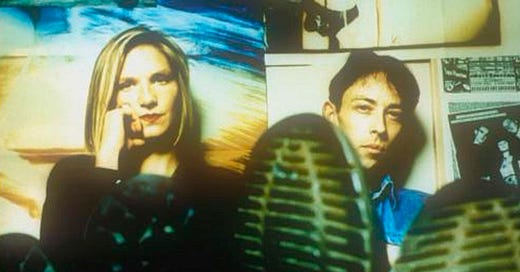


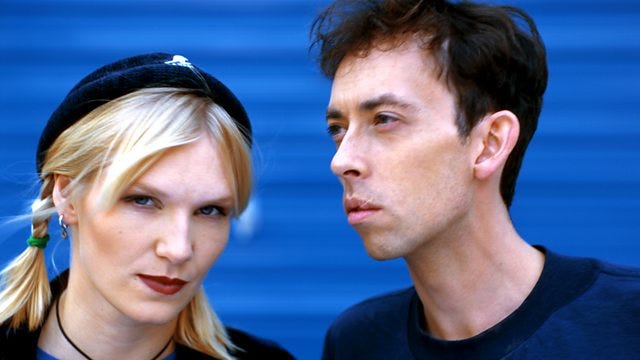
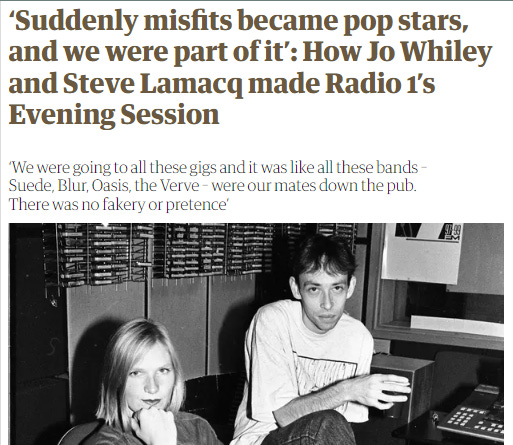

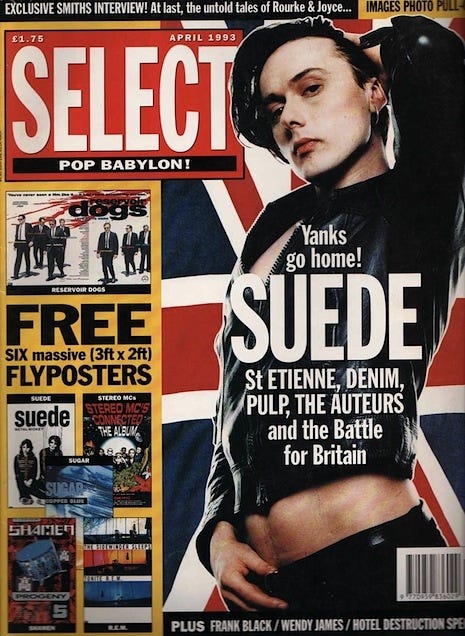
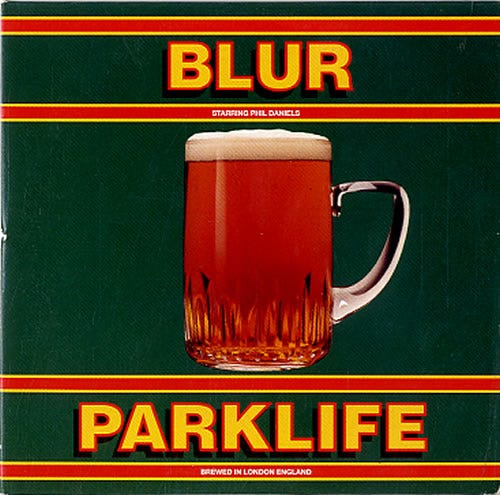



Brilliant. Keep on keeping on Neil.